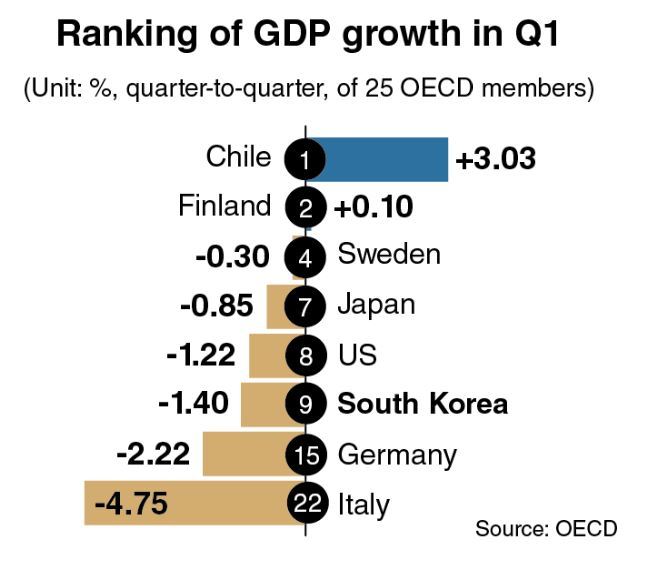 |
The headquarters of the Organization for Economic Cooperation and Development in Paris (OECD) |
SEJONG -- Of 25 major economies around the world, only two posted positive growth during the first quarter of 2020, according to a recent analysis from the Organization for Economic Cooperation and Development.
In terms of gross domestic product growth, South Korea ranked ninth among the 25 countries -- all OECD members -- posting minus 1.4 percent. Japan stood at No. 7 with minus 0.85 percent and the US at No. 8 with minus 1.22 percent.
As of Tuesday, the France-based organization had compiled figures on quarter-over-quarter economic growth for 25 of its 36 members, which are drawing wide attention amid the ongoing COVID-19 pandemic. Data for the other 11 OECD members has yet to be compiled.
The No. 1 country on the list, Chile, saw its economy advance 3.03 percent during the January-March period compared with the previous quarter.
Finland was the only other country that attained positive GDP growth, posting 0.1 percent.
Lithuania was third with minus 0.2 percent, followed by Sweden with minus 0.3 percent, Hungary with minus 0.4 percent and Poland with minus 0.5 percent.
 |
(Graphic by Kim Sun-young/The Korea Herald) |
Korea was followed by Norway, which stood at No. 10 with minus 1.55 percent. Next were Mexico with minus 1.6 percent, the Netherlands with minus 1.72 percent and Denmark with minus 1.9 percent.
The UK stood at No. 14 with minus 1.98 percent growth, trailed by Germany with minus 2.22 percent, Austria with minus 2.49 percent, Canada with minus 2.6 percent and Latvia with minus 2.9 percent.
Among those countries that saw their economies contract more than 3 percent were the Czech Republic with minus 3.6 percent, Belgium with minus 3.9 percent and Portugal with minus 3.9 percent.
The countries hit hardest by the novel coronavirus included Italy, which posted minus 4.75 percent GDP growth; Spain, which posted minus 5.24 percent; Slovakia, which saw minus 5.38 percent growth; and France, which recorded minus 5.83 percent.
According to data from the Center for Systems Science and Engineering at Johns Hopkins University, as of Tuesday Spain had the world’s fifth-greatest number of confirmed coronavirus cases, 235,772. Italy stood at No. 6 with 229,858 cases and France at No. 7 with 182,709.
The OECD also publicized the averages for members of the eurozone (minus 3.75 percent), the European Union (minus 3.33 percent) and the Group of Seven (minus 1.97 percent).
For comparison purposes it also mentioned the figures for three nonmembers, which also recorded negative growth -- China, minus 9.8 percent; Colombia, minus 2.39 percent; and Indonesia, minus 0.69 percent.
Chile seems to have more or less escaped the effects of COVID-19 in the first quarter, said a macroeconomics researcher in Seoul, because the epidemic started spreading rapidly across the South American continent only in late March or April.
Given that Chile ranked No. 16 in the world in the number of confirmed coronavirus cases (69,102 as of Tuesday), one question is whether the country can maintain positive growth in the second quarter.
Though the figure for Korea was not that bad, relatively speaking, exports are seriously sagging in the wake of economic slowdowns or recessions in major export destinations.
Korea saw its outbound shipments plunge 20.3 percent on-year during the May 1-20 period, data from the Korea Customs Service showed. For the period of Jan. 1 through May 20, it fell by 9.5 percent on-year.
While the government is struggling to pump up domestic demand by aggressively pouring taxpayer money into the retail services and household consumption sectors, the nation’s GDP growth depends heavily on export performance.
Some market observers are raising the possibility that middle-income households will eventually be saddled with a heavier tax burden, after receiving their disaster support funds from the government.
The government has also faced a sharp increase in the number of applications for unemployment benefits since February.
By Kim Yon-se (
kys@heraldcorp.com)






![[Exclusive] Hyundai Mobis eyes closer ties with BYD](http://res.heraldm.com/phpwas/restmb_idxmake.php?idx=644&simg=/content/image/2024/11/25/20241125050044_0.jpg)
![[Herald Review] 'Gangnam B-Side' combines social realism with masterful suspense, performance](http://res.heraldm.com/phpwas/restmb_idxmake.php?idx=644&simg=/content/image/2024/11/25/20241125050072_0.jpg)

